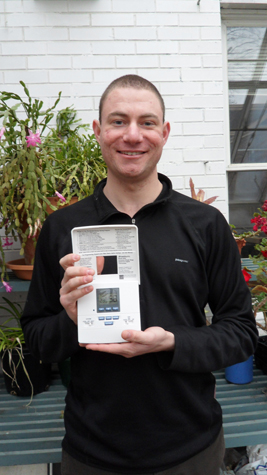Eva Jiménez came here from the Dominican Republic in September 2001. She had “the same reasons as most people,” she says: “looking for better life opportunities, a chance to study and work, and to help my family as well.”

‘A GREAT NEED’ Posner. |
She started out in factory jobs, then trained to become a teacher’s aide. She’s been doing that for seven years now at Alfred Lima Sr. Elementary School in Providence. Her goal is to become a teacher.
Last September, after years of wishing for it, Jiménez was sworn in as a US citizen. The whole process took less than six months; she had no trouble with the test. And the one barrier she hadn’t been able to surmount, the nearly $1000 cost, she covered with the help of an unusual lender.
The Capital Good Fund, a small nonprofit started last year by Andy Posner and Mollie West, both Brown University students at the time, is part of a new breed of microlenders who are applying here concepts that have enjoyed some success in the Third World.
Posner, whose group won a mention from Bill Clinton during a recent appearance on ABC’s This Week, says he got his inspiration from Muhammad Yunus, who created the Grameen Bank in Bangladesh and won the 2006 Nobel Peace Prize for developing microcredit.
Posner, who was studying for a master’s degree in environmental studies, says he read a book by Yunus and thought, “This is absolutely amazing. I wonder if we could do something like this here in Providence.”
He did more research, and through the Swearer Center for Public Service at Brown, connected with West, then a junior, who had similar interests. Over the summer of 2008, they met with community leaders to learn more about local needs; from there, “it just snowballed,” he says. “There was such a great need for this, and there was nobody doing this type of work in Rhode Island.”
In February 2009, they incorporated as the Capital Good Fund; in April 2009, they got their 501(c)(3) designation. They borrowed their startup funds from family and friends, and they shaped their loan products with input from focus groups and discussions with people in the community.
They started with two kinds of loans: business loans of $500 to $3000, and — because they’d heard so much about the prohibitive cost of applying for citizenship — $895 loans to cover the $695 application plus $200 for legal representation and guidance by the International Institute of Rhode Island.
The business loans are geared to people who need to cover basic startup costs such as getting a license and insurance, Posner says. Other costs covered: the purchase of a computer, building of a web site, and marketing.
Ducy Cornejo, a Bolivian immigrant, borrowed $3000 to start a green cleaning company. Carmen Mirabal got $3000 to help grow her handmade, organic vegetable soap, lotion, and soy candle business. Even small amounts “can do a whole lot” for a business, Posner says — and for more ambitious entrepreneurs, they can provide a modest start and a chance to build credit.